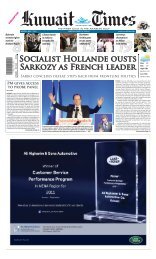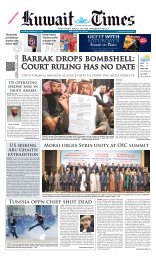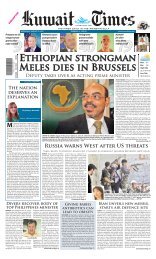Create successful ePaper yourself
Turn your PDF publications into a flip-book with our unique Google optimized e-Paper software.
FRIDAY, AUGUST 31, 2012<br />
1. How to Win Friends & Influence People<br />
Dale Carnegie, 1936. Arguably the first self-help book in the<br />
genre.<br />
2. Keys to Success<br />
Napoleon Hill, 1947. Interviews with Carnegie, Ford, and<br />
Rockefeller led to 17 “keys” to success.<br />
3. The 7 Habits of Highly Effective People<br />
Stephen Covey, 1989. Covey identifies seven qualities that we<br />
must develop in order to reach our potential.<br />
4. How to Stop Worrying and Start Living<br />
Dale Carnegie, 1948. Tired of worrying about everything,<br />
Carnegie set out to purge worry from his life.<br />
5. The Prophet<br />
Kahlil Gibran, 1923. Living a proper life is the aim, but Gibran<br />
says we can’t do by following others.<br />
6. The Alchemist<br />
Paulo Coelho, 2006. A young Andalusian sheepherder sets out<br />
in seek of money and fame.<br />
7. Who Moved My Cheese?<br />
Spencer Johnson, 1998. Two mice and two humans live in a<br />
maze where their cheese disappears. A parable for life.<br />
8. The 48 Laws of Power<br />
Robert Greene, 2000. “The 48 Laws of Power” draws inspiration<br />
from war (Sun-Tzu) and politics (Machiavelli).<br />
9. Rich Dad, Poor Dad<br />
Robert Kiyosaki, 2000. ‘What the Rich Teach Their Kids About<br />
Money - That the Poor and Middle Class Do Not!’<br />
10. Awaken the Giant Within<br />
Anthony Robbins, 1992. How to Take Immediate Control of<br />
Your Mental, Emotional, Physical and Financial Destiny.<br />
11. The Secret<br />
Rhonda Byrne, 2006. The things that we think about determine<br />
our reality. It’s the ‘Law of Attraction.’<br />
12. The 4-Hour Workweek<br />
Timothy Ferriss, 2007. Practice “selective ignorance” to give<br />
yourself more time to join the new rich.<br />
13. The Power of Myth<br />
Joseph Campbell and Bill Moyers, 1991. A look at how ancient<br />
mythology is still relevant thousands of years later<br />
14. The Power of Now<br />
Eckhart Tolle, 1997. Tolle teaches move beyond thoughts of the<br />
past or future, and live, finally, in the present moment.<br />
15. The Spontaneous Fulfillment of Desire<br />
Deepak Chopra, 2003. ‘Coincidences’ offer glimpses of the infinite<br />
possibilities we could embrace.<br />
16. The Art of Happiness<br />
Dalai Lama and Howard C. Cutler, 1998. A readable and enlightening<br />
look at Buddhism and the Dalai Lama.<br />
17. Flow: The Psychology of Optimal Experience<br />
Mihaly Csikszentmihalyi, 1991. Artists, runners, chess playerseveryone<br />
can attain ‘flow,’ and there’s little else like it.<br />
18. The Tipping Point<br />
Malcolm Gladwell, 2002. When ‘memes’ (viral ideas) come in<br />
contact with the right person, the world changes.<br />
19. The Four Agreements<br />
Don Miguel Ruiz, 2001. The four agreements are pacts that he<br />
believes you must make with yourself in order to be happy.<br />
20. The Aladdin Factor<br />
Jack Canfield, Mark Victor Hansen, 1995. Five things stand in<br />
the way of what we want: 1) Ignorance; 2) Limiting beliefs; 3)<br />
Fear; 4) Low self-esteem; and 5) Pride.<br />
21. Self-Esteem<br />
Matthew McKay (Author), Patrick Fanning, 2000. ‘A Proven<br />
Program of Cognitive Techniques for Assessing, Improving, and<br />
Maintaining Your Self-Esteem’.<br />
22. Unlimited Power<br />
Anthony Robbins, 1986. The sweeping and candid book that<br />
put Tony Robbins on the map.<br />
23. Better Than Good<br />
Zig Ziglar, 2007. Ziglar’s ideas evoke a passion that goes<br />
beyond financial gain and status.<br />
24. When Bad Things Happen to Good People<br />
Harold Kushner, 1981. Why are we here if terrible things can<br />
happen with no rhyme and no reason?<br />
25. The One Minute Millionaire<br />
Mark Victor Hansen, 2002. A fictional tale of a woman trying to<br />
claw her way out of poverty, and real-world tips for quitting<br />
your nine-to-five.<br />
26. Learned Optimism<br />
Martin Seligman, 1998. Pessimists believe external events are<br />
their fault while optimists view them as temporary roadblocks.<br />
27. The PTSD Workbook<br />
Mary Beth Williams, Soili Poijula, 2002. Simple and effective<br />
techniques for overcoming traumatic stress symptoms.<br />
28. The Last Lecture<br />
Randy Pausch, 2008. What wisdom would you try to impart to<br />
the world if you knew it was your last chance?<br />
29. Finding Your Own North Star<br />
Martha Beck, 2002. The North Star is our driving motivation<br />
that hovers somewhere near our souls.<br />
30. I’m OK-You’re OK<br />
Thomas Harris, 1969. Too often, Harris argues, we fall prey to<br />
The Contamination of the Adult.<br />
31. A New Earth<br />
Eckhart Tolle, 2008. Tolle argues humankind is on the verge of a<br />
new, non-denominational spiritual awakening.<br />
32. Outliers: The Story of Success<br />
Malcolm Gladwell, 2008. Why do some among us succeed<br />
while so many others fail to reach their potential?<br />
33. My Stroke of Insight<br />
Jill Bolte Taylor, 2006. A Harvard-trained brain scientist suffers a<br />
stroke that eventually leads her to a new state of enlightenment.<br />
34. Extraordinary Minds<br />
Howard Gardner, 1998. What traits are shared by Mozart, Freud,<br />
Woolf, and Gandhi? Gardner seeks out the ties that bind them.<br />
35. The Intention Experiment<br />
Lynne McTaggart, 2008. Experiments on the fringe of science<br />
challenge some of academia’s most hallowed precepts about<br />
the power of the mind.<br />
36. I Am a Strange Loop<br />
Douglas R. Hofstadter, 2007. Our personalities aren’t as<br />
entrenched as we like to think. Knowing how it works teaches<br />
us to manipulate it.<br />
37. Who Are You Really, and What Do You Want?<br />
Shad Helmstetter, 2003. If you truly want to succeed, you must<br />
stack the cards in your favor.<br />
38. What to Say When You Talk to Yourself<br />
Shad Helmstetter, 1990. Change your inner monologue from<br />
negative to positive and your life will change in unexpected<br />
ways.<br />
39. How to Think Like a CEO<br />
D A Benton, 1998. D.A. Benton interviewed more than 100<br />
Books<br />
CEOs to figure out how their thinking differs from that of everyone<br />
else.<br />
40. Buddha: A Story of Enlightenment<br />
Deepak Chopra, 2008. As we learn about Buddha’s transformation<br />
we learn the core tenants of religion.<br />
41. Wherever You Go, There You Are<br />
Jon Kabat-zinn, 1995. Like a poetic How-To manual, Kabat’s<br />
book is evidence that everyone can benefit from meditation.<br />
42. Stumbling on Happiness<br />
Daniel Gilbert, 2007. The one ability we have above animals is<br />
to predict the future. Unfortunately, our predictions aren’t<br />
great.<br />
43. Change Your Brain, Change Your Life<br />
Daniel G. Amen, 1999. A breakthrough program for conquering<br />
anxiety, depression, obsessiveness, anger, and impulsiveness.<br />
44. Getting Things Done<br />
David Allen, 2002. Organizing your life too much is worse than<br />
organizing at all. Clear the clutter and focus on the task at hand.<br />
45. The Anxiety & Phobia Workbook<br />
Edmund J. Bourne, 2005. A book that delves deeply into the<br />
causes of our fears and discomforts, then gives tips to overcome<br />
them.<br />
46. Goodbye to Shy<br />
Leil Lowndes, 2006. A former shy girl herself, Lowndes is now a<br />
professional speaker, and her book offers 85 ways to become<br />
more outgoing.<br />
47. Conversationally Speaking<br />
Alan Garner, 1997. Tested new ways to increase your personal<br />
and social effectiveness.<br />
48. The Magic of Thinking Big<br />
David Schwartz, 1987. Don’t worry about the size of your brain<br />
so much as your ability to think outside the box.<br />
49. How to Talk to Anyone<br />
Leil Lowndes, 2003. Lowndes details 92 steps that focus largely<br />
on meeting new people and making them friends.<br />
50. Talent Is Overrated<br />
Geoff Colvin, 2008. What really separates world-class performers<br />
from everybody else.<br />
— www.selfhelp.fm

















